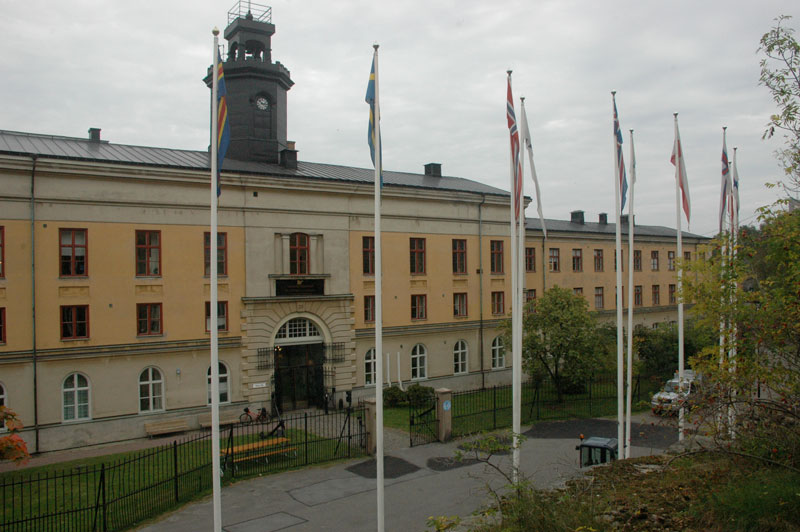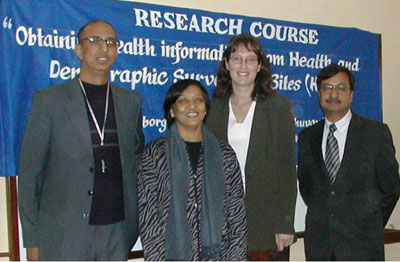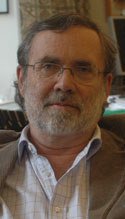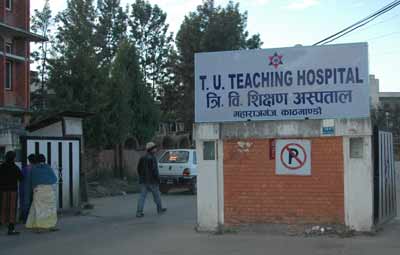SWEDISH SOUTH ASIAN STUDIES NETWORK

Nordic School of Public Health, Gothenburg
Postal address: Nordiska högskolan
för folkhälsovetenskap (NHV),
Box 12133, SE-402 42
Göteborg, Sweden
Visiting address: Nya varvet, building
25
Phone: +46 (0)31 693 900
Web page: http://www.nhv.se/
Contact
persons:
– General queries:
Dean Marie Beckman Suurküla,
Vice Dean Alexandra Krettek
Public Relations Officer Monica Bengtson
– Educational queries
Director of Advanced Studies Lene Povlsen
Director of Research Studies Bengt Åhgren
The Nordic School of Public Health (NHV) is a Nordic institution established in 1953 and funded by the Nordic Council of Ministers (Nordiska ministerrådet). It offers higher education and research in the field of public health for persons working within health and medical services in the Nordic countries Sweden, Norway, Denmark, Iceland and Finland. In addition, NHV has a large student body outside the Nordic Countries due to extensive distance learning opportunities. It is possible to take single courses or a combination of courses that lead to a degree. English speaking students can obtain a Diploma in Public Health, Master of Public Health (MPH), or Doctor of Public Health (DrPH). Additional diploma programs are available in Scandinavian language.
South Asia related research at NHV:
 Alexandra Krettek (photo to the right) works as Senior Lecturer at NHV since 2007. Besides, she is also Associate Professor of Cardiovascular Prevention at the Institute of Medicine, Sahlgrenska Academy, University of Gothenburg, since 2005. She supervises both doctoral (PhD and DrPH) and graduate (MPH) students. More information about Alexandra.
Alexandra Krettek (photo to the right) works as Senior Lecturer at NHV since 2007. Besides, she is also Associate Professor of Cardiovascular Prevention at the Institute of Medicine, Sahlgrenska Academy, University of Gothenburg, since 2005. She supervises both doctoral (PhD and DrPH) and graduate (MPH) students. More information about Alexandra.
Over the years, her research has focused on the molecular mechanisms that govern atherosclerosis development. Alexandra is currently involved in community-based studies in Nepal, with focus on cardiovascular disease prevention. The project is entitled ”Non-communicable diseases in Nepal”, and focuses on surveillance of risk factors for obesity, diabetes, and cardiovascular disease in population groups of Nepal – a country in rapid transition with imminent lifestyle changes. Part of the research work will be to establish health demographic surveillance sites (HDSS) in Nepal. More information about the project.
Abstract: The World Health Organization (WHO) estimates that in 2020, non-communicable disease burden (i.e., cardiovascular diseases, cancer, chronic respiratory diseases, diabetes) will constitute 51% of all deaths in low- and middle-income countries. The South Asian region is home to more than 20% of the world’s population with CVD being the leading cause of morbidity, mortality and disability in this region.
Low- and middle-income countries currently undergo social and demographic changes with rapid urbanization and expanding industrialization.
High prevalence of lifestyle-related risk factors that further the development of non-communicable diseases follows with a change in disease pattern away from infectious, communicable diseases. A shift from a diet rich in fibers and complex carbohydrates to more sugars and fats predisposes for CVD and its risk factors obesity and type 2 diabetes.
Cardiovascular diseases (CVD) are emerging as major cause of death; hence policies, strategies, and interventions should be based on information from surveillance of these ongoing changes.
The South Asian countries Nepal, India, Pakistan, Sri-Lanka, and Bangladesh contribute most to the worldwide CVD burden. Early myocardial infarction is more common since cardioprotective factors (exercise, fruit and vegetable intake, alcohol consumption) are lower and harmful factors (elevated apolipoprotein B100/apoliprotein A-I ratio, diabetes, tobacco use) are common in native South Asians . Individuals in this region acquire heart disease ten years earlier than the average individual in the west. In addition, populations with different ethnicity display varied risks for developing insulin resistance and obesity.
The research aims to test the following hypotheses;
• There are differences in the prevalence of obesity, diabetes and CVD risk factors in population groups of Indo-Aryan and Mongolian origins and between urban and rural areas
• The changes in prevalence of obesity, diabetes and CVD risk factors over time and in economic strata are dissimilar between population groups of Indo-Aryan or Mongolian origins
• During and after migration from rural to urban areas, population groups of Indo-Aryan or Mongolian origins in Nepal differ in their susceptibility to develop obesity, diabetes, and CVD
 |
| Drs. Abhinav Vaidya, Suraj Shakya, Alexandra Krettek, and Subarna Mani Acharya (from left to right) during a research course on health demographic surveillance sites. This course was given in Kathmandu, Nepal by the Nordic School of Public Health in collaboration with Institute of Medicine, Tribhuvan University. |
Two PhD candidates from Nepal are working on their dissertation projects at NHV:
Abhinav Vaidya, MD, works on a project entitled ”Effect of training health workers and volunteers on cardiovascular health literacy and practice in a rural community of Nepal”.
Abstract: Cardiovascular disease is a prevalent and growing, yet inadequately addressed, and often a neglected public health problem in Nepal. Most of the effort is being directed towards secondary or tertiary care in the available few hospitals, whereas the root causes, and the attempts to revert or minimise them, i.e. primary or primordial prevention, have remained paltry.
The present primary health system also ignores the majority of the non-communicable diseases, mainly because of the priority health problems such as infectious diseases. The current study, which is planned at Duwakot and Jhaukhel Villages of Bhaktapur district, aims, first, to accumulate scientific data on the epidemiological factors pertaining to cardiovascular health in Nepal.
Secondly, it attempts to improve upon the cardiovascular health status and knowledge of the community by implementing WHO guidelines. The local health workers and volunteers shall be trained. Findings in terms changes in the cardiovascular health knowledge and behaviour shall be compared to the control individuals. Feasibility of utilising the health workers for the purpose shall be evaluated.
Suraj Shakya, MD, works on a project entitled ”Association between primary open angle glaucoma, diabetes mellitus and systemic hypertension in ethnic populations of Nepal”.
Abstract: Glaucoma is one of the commonest causes of irreversible visual impairment and blindness.
Hypertension and diabetes mellitus are known to be an important risk factor for cardiovascular disease. Recent data suggest common mechanisms responsible for altering epithelial sodium transport in the distal nephron and ciliated epithelium of the eye.
Excessive renal sodium retention leads to systemic hypertension, and increased ciliary epithelial sodium transport leads to extrusion of sodium into the aqueous humour causing more aqueous secretion leading to a rise in intraocular pressure damaging the optic nerve head. A study from Birmingham shows a close association between systemic hypertension and primary open angle glaucoma. We have shown earlier that prevalence of primary open angle glaucoma varies in various ethnic population groups. The aims of the present study are; 1) To investigate the prevalence of primary open angle glaucoma among Gurungs, Tharus and Brahmins having systemic hypertension or diabetes mellitus or both and in control healthy individuals; 2) To test the hypothesis that different ethnic populations in Nepal have varied susceptibility to primary open angle glaucoma.
 Professor Göran
Bondjers (photo to the right) was Dean at NHV during 2006-2010. He has participated in initiating the Linnaeus-Palme students and teachers exchange programme between University of Gothenburg and the Institute
of Medicine, Tribhuvan University in Kathmandu, Nepal. The programme has run for a series of years and Göran Bondjers has visited Kathmandu several times. He has been extending the links with Tribhuvan University in Kathmandu over the years which has laid the foundation for some of NHV:s ongoing research plans in Nepal. More
information on the programme.
Professor Göran
Bondjers (photo to the right) was Dean at NHV during 2006-2010. He has participated in initiating the Linnaeus-Palme students and teachers exchange programme between University of Gothenburg and the Institute
of Medicine, Tribhuvan University in Kathmandu, Nepal. The programme has run for a series of years and Göran Bondjers has visited Kathmandu several times. He has been extending the links with Tribhuvan University in Kathmandu over the years which has laid the foundation for some of NHV:s ongoing research plans in Nepal. More
information on the programme.
In November 2005, Prof. Bondjers was awarded a Swedish Research Links planning grant by Sida and the Swedish
Research Council
for a project entitled ”Metabolic
dysfunction related to genetic factors and life style
– studies of ethnic groups in Nepal”.The project
was planned together with Professor Gopal
Acharya at Tribhuvan
University Teaching Hospital in Maharajgunj, Kathmandu.
The project dealt with
the fact that certain ethnic groups are more susceptible for
changes in lifestyle than others. Nepal is interesting to study
as the country houses a number of well-defined ethnic groups. The
researchers wanted to study the development of obesity, diabetes,
hypertension and cordonary vascular disease. Several other
Nepalese researchers were also involved, one of them being the
Sociologist Prof. Ritu Gartoulla. More information on the Swedish Research Links grants 2005.
 Professor Emeritus Bo Eriksson (photo to the left) has been working at NHV since 1979. He received a three-year (2007-09) Swedish Research Links grant, provided by SIDA/SAREC and the Swedish Research Council, for the project ”Fertility, sex ratio, mortality and socio-economy studied in two rural Demographic Surveillance Sites, India and Vietnam: Internal and external validity of information”.
Professor Emeritus Bo Eriksson (photo to the left) has been working at NHV since 1979. He received a three-year (2007-09) Swedish Research Links grant, provided by SIDA/SAREC and the Swedish Research Council, for the project ”Fertility, sex ratio, mortality and socio-economy studied in two rural Demographic Surveillance Sites, India and Vietnam: Internal and external validity of information”.
 It is carried out in collaboration with Nguyen
Xuan Than, Hanoi Medical University, Vietnam. Bo Eriksson research is also focused on the epidemiological field laboratory in BaVi, Vietnam, which started in 1999 with follow-up of more than 50000 persons to study vital events. The setting is also used for a variety of other studies, e.g. on equity in health. Prof. Eriksson is also involved in establishing health surveillance sites in Nepal.
It is carried out in collaboration with Nguyen
Xuan Than, Hanoi Medical University, Vietnam. Bo Eriksson research is also focused on the epidemiological field laboratory in BaVi, Vietnam, which started in 1999 with follow-up of more than 50000 persons to study vital events. The setting is also used for a variety of other studies, e.g. on equity in health. Prof. Eriksson is also involved in establishing health surveillance sites in Nepal.
Associate Professor Max Petzold (photo to the right ©Kristina Båth) is Senior Lecturer in Biostatistics at NHV since 2003 and involved in establishing health demographic surveillance sites in Nepal. A large part of his previous international work is based on the demographic surveillance sites in Vietnam (Dodalab in Hanoi, and FilaBaVi in Ba Vi) and Uganda (Iganga).
Collaboration project with Nepal part of Gothenburg’s Global University programme 
 University of Gothenburg has initiated a number of new international projects in collaboration with other institutions in Gothenburg as part of a long-term ambition to create a profile as ‘The Global University’. This notion is based on the university’s action plan for internationalisation 2008-2012. This plan focuses on the development of exchange, at all levels, with universities in other countries where special attention should also be given to developing a long-term and sustainable strategic collaboration with partners in for example South Asia. The cooperation efforts should be clearly linked to values of international solidarity and global responsibility, and must be of a different character than traditional student mobility. More information on The Global University.
University of Gothenburg has initiated a number of new international projects in collaboration with other institutions in Gothenburg as part of a long-term ambition to create a profile as ‘The Global University’. This notion is based on the university’s action plan for internationalisation 2008-2012. This plan focuses on the development of exchange, at all levels, with universities in other countries where special attention should also be given to developing a long-term and sustainable strategic collaboration with partners in for example South Asia. The cooperation efforts should be clearly linked to values of international solidarity and global responsibility, and must be of a different character than traditional student mobility. More information on The Global University.
Associate Professor Alexandra Krettek heads one of these projects that were approved in November 2010. It is a collaboration project with three partner universities in Nepal – Kathmandu University, Tribhuvan University, and Patan Academy of Health Sciences. The project is entitled ”Collaboration between GU and Nepali Institutions: Strengthening Health Education, Supporting Research, Monitoring Health”. It is based on previous Linnaeus Palme exchange programme experiences with Tribhuvan University (more information), but is much wider, including additional Nepali institutions and programmes, and extending its focus to both education and research.
The exchange programme has also been extended to include administrative staff and PhD candidates.
The other project members are Associate Professor Göran Kurlberg and Professor Göran Bondjers at the Sahlgrenska Academy; Associate Professor Ulla-Britt Engelbrektsson and PhD candidate Susanne Åsman, Social Anthropology, School of Global Studies; Lecturer Jonas Öberg, Dept. of Applied IT; and Professor Emeritus Jan Bärmark, Dept. of Philosophy, Linguistics and Theory of Science.
More information about the Nepal collaboration project. ![]()
On Friday 27 May 2011, Lars Eklund and Julia Velkova from SASNET visited Gothenburg, and met Alexandra Krettek and Göran Bondjers, to learn about the new collaboration project. Read a report from the meeting. ![]()
SASNET - Swedish South Asian
Studies Network/Lund University
Address: Scheelevägen 15 D, SE-223 70 Lund, Sweden
Phone: +46 46 222 73 40
Webmaster: Lars Eklund
Last updated
2011-08-23
